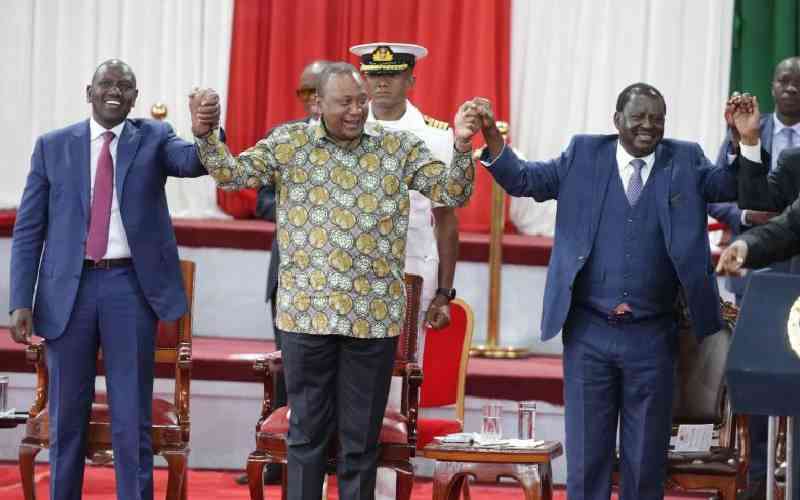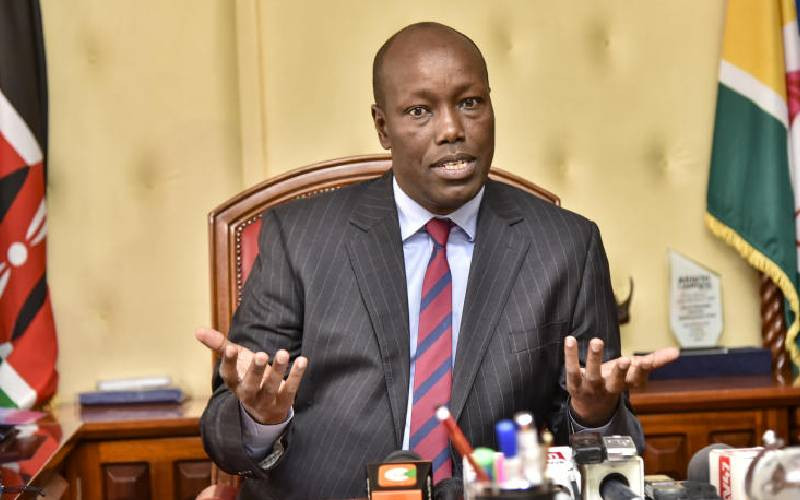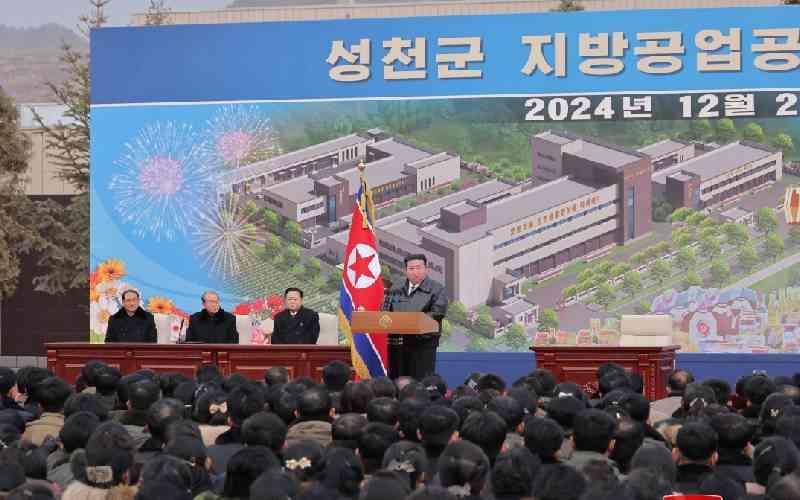President Uhuru Kenyatta appears to have beaten a retreat on his initial pledge to leave politicians out of his Cabinet.
Sometime in April 2013, as the president and his deputy settled down to the business of forming their first Cabinet, Deputy President William Ruto made a statement that appeared to signal a radical departure from the past.
“Don’t spend a lot of time trying to find among the nominees who is TNA and who is URP... who is the rest of the coalition partners because they don’t exist. In the Cabinet, there will only be two politicians — the President and myself,” Ruto said. The DP was reacting to speculation over who would take up the remaining 14 slots in Cabinet after President Uhuru Kenyatta’s announcement of the initial four nominees.
However, the Executive back tracked on its pronouncement with the inclusion of former MPs Najib Balala (Mvita) and Charity Ngilu (Kitui Central) in a list of nominees to the Cabinet. Mr Balala and Ms Ngilu lost in the senatorial race in Mombasa and Kitui counties respectively in the 2013 elections.
The explanation given by the Executive at the time was that it had been agreed that the two would not engage in politics during their time in office.
Difficult time in office
Last week, three more politicians—Mwangi Kiunjuri (former MP, Laikipia East), Charles Keter (Senator, Kericho County) and Dan Kazungu (MP Malindi)—made it to the list of Cabinet nominees. They now join other politicians Eugene Wamalwa (former MP, Saboti), Balala and former Kajiado Central MP Joseph Nkaissery. Mr Wamalwa, Balala and Maj Gen (rtd) Nkaissery head the Water, Tourism and Interior dockets, respectively. Mr Kiunjuri, Mr Kazungu and Mr Keter have been nominated to head the Devolution, Mining and Energy dockets respectively. Should the nominees get parliamentary approval, it would bring the total number of politicians in Cabinet to six out of 20.
Questions have been raised about the inclusion of “political” nominees ahead of the 2017 General Election given that this would force two by-elections to replace Keter and Kazungu, should they get the parliamentary nod. So why the shift and of what import is the inclusion of these politicians to Cabinet?
“The Constitution gives the President the prerogative to make nominations to the Cabinet. The issue of having politicians in the Cabinet does not arise because those currently holding such posts will resign when they take up the positions in Government,” said Munyori Buku, a senior Director of Public Communication at State House.
Kiunjuri, a former teacher, rose to the position of MP and assistant minister in the Energy, Water and Public Works ministries under the Grand Coalition Government of former President Kibaki and Prime Minister Raila Odinga. He has now been nominated to head the powerful Devolution Ministry following the resignation Anne Waiguru.
If approved by Parliament he will take over a ministry that has been in the spotlight over graft allegations running into billions of shillings, with the high profile case being loss of over Sh791 million from the National Youth Service. The ministry’s role has often been questioned with critics citing “duplication” of roles with county governments.
It’s not lost on observers that nominating the former Laikipia East MP points to a move by Jubilee to consolidate its political base ahead of the 2017 elections. During the 2013 elections, Kiunjuri stuck to the Grand National Union party when all roads in Central Kenya and its “diaspora counties” were leading to TNA. That decision would cost him at the ballot. He lost to political newcomer Joshua Irungu in the governorship race. He has since appeared to have learnt some lessons.
Speaking during a function in Nanyuki town last year, Kiunjuri said; “Our dog did not bring anything home from the hunting expedition. Let us now support the President and governors in their development agenda. TNA is a good party because it is the President’s party.”
This decision “to work with Government” appears to have paid off, with the former MP giving Laikipia County a first Cabinet position in 27 years. His nomination is also seen as a move to placate an electorate that has increasingly felt overlooked.
“What is clear from the Cabinet reshuffle is that the technocrats, envisioned in the Constitution as a better choice because they would not be under pressure from constituents to engage in corruption, have had a difficult time in office. But the bigger question to ask is whether the choice of these politicians is a pointer to a failure of this model, as envisioned by the Constitution,” says former Permanent Secretary for Ethics and Governance, John Githongo.
Stay informed. Subscribe to our newsletter
The University of Nairobi’s Head of Department of Political Science and Public Administration, Dr Adams Oloo, agrees. “Jubilee is realising that although it may have wanted technocrats in Cabinet, the nature of our system of politics is that you need politicians to carry through your agenda,” he says. He cites the nomination of Kiunjuri, to the Devolution docket as a realisation by Jubilee of the need to have in Cabinet individuals that can take on political fights. He sees Kazungu’s nomination as aimed at appealing to a section of the Coastal voting bloc.
Oloo, however, makes a different observation with the nomination of Dr Cleophas Mailu to the Health docket, a technocrat who, in his view, may lack the necessary political mileage, as a pointer that the ruling coalition may be “giving up” on the Kamba vote. Mailu is seen as Ngilu’s replacement in the Cabinet.
Connect with the electorate
But why the selection of politicians as opposed to technocrats? Politicians can build their own networks and are able to connect with the electorate in ways that technocrats cannot.
The choice of Keter, for instance, could be read as a move to keep the South Rift voting bloc, which at some point was felt to be peeling off from the ruling Coalition, in check, as well as contain outspoken Bomet County Governor Isaac Ruto. Keter and Isaac Ruto are from the populous Kipsigis community.
Keter served as an assistant minister in the Energy docket under the Grand Coalition Government, and was the only casualty of a Cabinet reshuffle that saw him sacked in 2010. During that reshuffle, DP Ruto was moved from Agriculture to the Higher Education docket in what was seen as a reaction to his dissent to ODM’s support for the constitutional referendum.
Keter is a close ally of Ruto and will be taking over a ministry also dogged by corruption claims that have since claimed several casualties. Currently nine members of the Geothermal Development Company tender committee are facing abuse of office charges. Kenya Pipeline Corporation boss Charles Tanui is also facing corruption charges in court. The persistent hunt for the Coastal vote could explain Kazungu’s nomination to the Mining docket, previously held by another Coastal, Balala, who now moves to Tourism. Sections of leaders from the Mijikenda community have thanked the President for “finally bringing back the Mijikenda to Cabinet after months in the cold”.
The Malindi MP is seen as a replacement to former Labour CS Kazungu Kambi who was forced to step aside over corruption allegations in the ministry, and fell by the wayside in the reshuffle.
 The Standard Group Plc is a
multi-media organization with investments in media platforms spanning newspaper
print operations, television, radio broadcasting, digital and online services. The
Standard Group is recognized as a leading multi-media house in Kenya with a key
influence in matters of national and international interest.
The Standard Group Plc is a
multi-media organization with investments in media platforms spanning newspaper
print operations, television, radio broadcasting, digital and online services. The
Standard Group is recognized as a leading multi-media house in Kenya with a key
influence in matters of national and international interest.
 The Standard Group Plc is a
multi-media organization with investments in media platforms spanning newspaper
print operations, television, radio broadcasting, digital and online services. The
Standard Group is recognized as a leading multi-media house in Kenya with a key
influence in matters of national and international interest.
The Standard Group Plc is a
multi-media organization with investments in media platforms spanning newspaper
print operations, television, radio broadcasting, digital and online services. The
Standard Group is recognized as a leading multi-media house in Kenya with a key
influence in matters of national and international interest.








